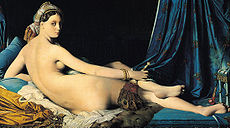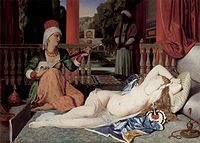
Odalisque
Encyclopedia

Ottoman Empire
The Ottoman EmpireIt was usually referred to as the "Ottoman Empire", the "Turkish Empire", the "Ottoman Caliphate" or more commonly "Turkey" by its contemporaries...
seraglio
Seraglio
A seraglio or serail is the sequestered living quarters used by wives and concubines in a Turkish household. The word comes from an Italian variant of Turkish saray, from Persian sarai , meaning palace, or the enclosed courts for the wives and concubines of the harem of a house or palace...
. She was an assistant or apprentice to the concubines and wives, and she might rise in status to become one of them. Most odalisques were part of the Imperial Harem
Imperial Harem
The Imperial Harem of the Ottoman Empire was one of the most important elements of the Ottoman court. It was known in the West as "the Seraglio", an Italian term.- Harem quarters:...
, that is, the household of the sultan
Sultan
Sultan is a title with several historical meanings. Originally, it was an Arabic language abstract noun meaning "strength", "authority", "rulership", and "dictatorship", derived from the masdar سلطة , meaning "authority" or "power". Later, it came to be used as the title of certain rulers who...
.
Etymology
The word "odalisque" is French in form and originates from the TurkishTurkish language
Turkish is a language spoken as a native language by over 83 million people worldwide, making it the most commonly spoken of the Turkic languages. Its speakers are located predominantly in Turkey and Northern Cyprus with smaller groups in Iraq, Greece, Bulgaria, the Republic of Macedonia, Kosovo,...
odalık, meaning "chambermaid", from oda, "chamber" or "room". It can also be transliterated odahlic, odalisk, and odaliq.
Status
An odalisque was not a concubine of the harem, but it was possible that she could become one. Odalisques were ranked at the bottom of the social stratificationSocial stratification
In sociology the social stratification is a concept of class, involving the "classification of persons into groups based on shared socio-economic conditions ... a relational set of inequalities with economic, social, political and ideological dimensions."...
of a harem, serving not the man of the household, but rather, his concubines and wives as personal chambermaids. Odalisques were usually slaves given as gifts to the sultan, bought or given by wealthy Turkish men. Generally, an odalisque was never seen by the sultan, but instead remained under the direct supervision of his mother, the Valide sultan
Valide Sultan
Valide Sultan was the title held by the mother of a ruling Sultan in the Ottoman Empire. The Turkish pronunciation of the word Valide is . The title is sometimes translated as Queen Mother, although the position of Valide Sultan was quite different.The position was perhaps the most important...
. If an odalisque was of extraordinary beauty or had exceptional talents in dancing or singing, she would be trained as a possible concubine. If selected, an odalisque trained as a concubine would serve the sultan sexually, and only after such sexual contact would she change in status, becoming thenceforth a concubine. In the Ottoman Empire, concubines encountered the sultan only once—unless she was especially skilled in dance, singing, or the sexual arts, and thus gained his attention. If a concubine's contact with the sultan resulted in the birth of a son, she would become one of his wives.
Later usage


In popular use, the word odalisque also may refer to a mistress
Mistress (lover)
A mistress is a long-term female lover and companion who is not married to her partner; the term is used especially when her partner is married. The relationship generally is stable and at least semi-permanent; however, the couple does not live together openly. Also the relationship is usually,...
, concubine or paramour of a wealthy man.
During the 19th century, odalisques became common fantasy figures in the artistic movement known as Orientalism
Orientalism
Orientalism is a term used for the imitation or depiction of aspects of Eastern cultures in the West by writers, designers and artists, as well as having other meanings...
, being featured in many erotic paintings from that era.
See also
- Culture of the Ottoman EmpireCulture of the Ottoman EmpireThe culture of the Ottoman Empire evolved over several centuries as the ruling administration of the Turks absorbed, adapted and modified the cultures of conquered lands and their peoples...
- Islam and slaveryIslam and SlaveryIslamic views on slavery first developed out of the slavery practices of pre-Islamic Arabia. During the wars between different states/tribes in various parts of the world, prisoners/captives were either killed or enslaved...
- HammamHammamA Turkish bath is the Turkish variant of a steam bath, sauna or Russian Bath, distinguished by a focus on water, as distinct from ambient steam....
- KöçekKöçekThe köçek phenomenon is one of the significant features of Ottoman Empire culture...
- Ottoman Turkish languageOttoman Turkish languageThe Ottoman Turkish language or Ottoman language is the variety of the Turkish language that was used for administrative and literary purposes in the Ottoman Empire. It borrows extensively from Arabic and Persian, and was written in a variant of the Perso-Arabic script...
Sources
- The Imperial Harem by Leslie Pierce
- The Nature of the Early Ottoman State by Heath W Lowry

